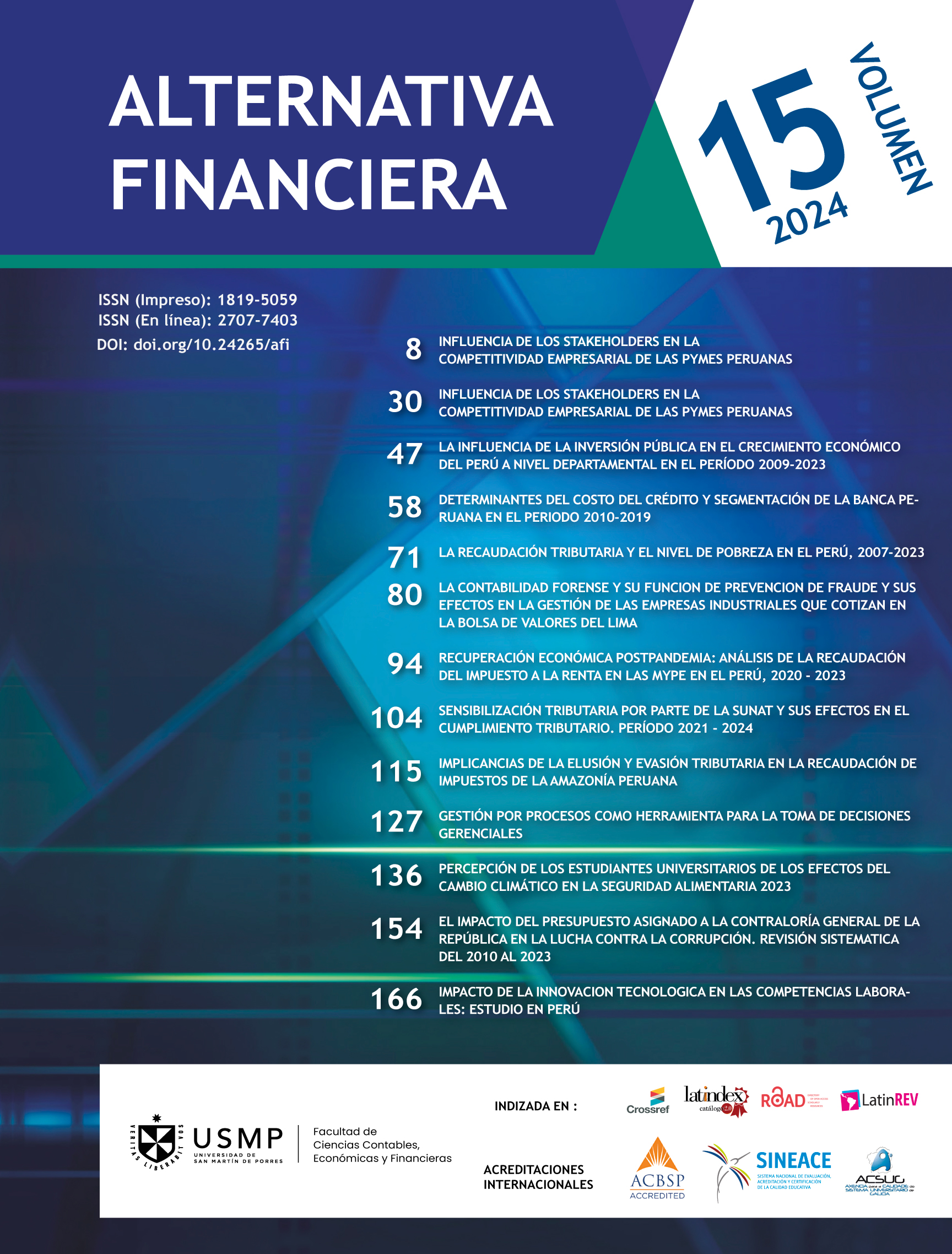IMPACT OF TECHNOLOGICAL INNOVATION ON WORK SKILLS: STUDY IN PERU
Keywords:
innovación tecnológica, habilidades laborales, mercado laboral, competencias laborales, grupos demog´ráficosAbstract
Business activity in Peru was affected since the opening of markets with free trade agreements, which has caused companies to increase their competitiveness focused on a global vision, a strategic plan and having collaborators whose competence index labor is of an excellent level. However, another of the external factors that influenced the changes and that will continue to influence, among others, is the technology focused on administrative processes and production and service lines. Which will motivate the reduction in demand for traditional jobs in new jobs of a strictly technological nature.
This research is supported by the growing technological advances and how these affect the employability and demand for jobs in Peru by 2030. In this sense, a systemic review of the main studies that support the importance of the technological preparation of the technical and specialized labor of the workforce in Peru. Likewise, it addresses the skills gaps generated by technological innovation in different demographic groups in the Peruvian labor market. Its objective is to identify disparities in job skills to improve employability and adaptation to the constantly evolving Peruvian labor market. The methodology used was based on the systematic review of relevant scientific literature, analyzing recent studies on the relationship between technological innovation and work skills in the Peruvian context. The results reveal the existence of a gap between labor demand and the training offered, as well as significant differences in the challenges faced by graduates in the labor market. In conclusion, this study highlights the need to adapt academic training to market demands and recommends future research to further reduce these gaps and promote labor equity in the Peruvian market.
KEYWORDS: Technological innovation, Work skills. Labor market, Job skills, Demographic groups.
Downloads
References
Amaya, E. and Mougenot, B. (2019). The gender differences in highly paid wage: a case study of peruvian physicians. Cadernos De Saúde Pública, 35(5). https://doi.org/10.1590/0102-311x0004301
Bentaouet Kattan, R., Macdonald, K., & Patrinos, H. A. (2021). The role of education in mitigating automation’s effect on wage inequality. Labour, 35(1), 79-104 Behluli, A., Qerimi, F., Pula, F., & Shabani, L. (2022). The impact of graduates’ skills
on facing challenges in the labor market. Emerging Science Journal, 6(2), 399-417. https://doi.org/10.28991/esj-2022-06-02-014
Cao, Y., Cheng, S., Tucker, J., & Wan, C. (2023). Technological peer pressure and skill specificity of job postings. Contemporary Accounting Research, 40(3), 2106-2139. https://doi.org/10.1111/1911-3846.12870
Carpio-Gallegos, D., & Miralles, F. (2021). El impacto de redes de colaboración en la innovación tecnológica en empresas. RETOS. Revista de Ciencias de la Administración y Economía, 11(22), 315-331
Cortes, P. and Pan, J. (2020). Children and the remaining gender gaps in the labor market. SSRN Electronic Journal. https://doi.org/10.2139/ssrn.3718892
Dechezleprêtre, A., Hemous, D., Olsen, M. y Zanella, C. (2019). Automatización del trabajo: evidencia de datos de patentes a nivel de empresa. Disponible en SSRN 3508783
Falck, O., Heimisch, A., & Wiederhold, S. (2021). Returns to ict skills. Research Policy, 50(7), 104064. https://doi.org/10.1016/j.respol.2020.104064
Foladori, G., Ortiz-Espinoza, A. (2022). La relación capital-trabajo en la Industria 4.0. Íconos. Revista de Ciencias Sociales 73: 161-177. https://doi.org/10.17141/iconos.73.2022.5198
Gong, R., Wu, Y., Chen, F., & Yan, T. (2020).
Labor costs, market environment and green technological innovation: evidence from high-pollution firms. International Journal of Environmental Research and Public Health, 17(2), 522. https://doi.org/10.3390/ijerph17020522
Gómez, S. and Luna, A. (2023). Competence training and employability. Journal of Educational and Social Research, 13(1), 1. https://doi.org/10.36941/jesr-2023-0001
Hepp, J. (2020). Being small at the right moment: path dependence after a shift in the technological regime. SSRN Electronic Journal. https://doi.org/10.2139/ssrn.3773705
Kattan, R. and Macdonald, K. (2020). The role of education in mitigating automation’s effect on wage inequality. Labour, 35(1), 79-104. https://doi.org/10.1111/labr.12187
Liu, X., Seevers, R., & Lin, H. (2022). Employability skills for mice management in the context of icts. Plos One, 17(7), e0271430. https://doi.org/10.1371/journal.pone.0271430
Muja, A., Blommaert, L., Gesthuizen, M., & Wolbers, M. (2019). The role of different types of skills and signals in youth labor market integration. Empirical Research in Vocational Education and Training, 11(1).
https://doi.org/10.1186/s40461-019-0081-3
Nakajima, N., Jung, H., Pradhan, M., Hasan, A., Kinnell, A., & Brinkman, S. (2020). Gender gaps in cognitive and
social‐emotional skills in early primary grades: evidence from rural indonesia. Developmental Science, 23(5). https://doi.org/10.1111/desc.12931
Oliveira, E. and Rodrigues, P. (2021). A review of literature on human behaviour and artificial intelligence: contributions towards knowledge management. Electronic Journal of Knowledge Management, 19(2), pp165-
https://doi.org/10.34190/ejkm.19.2.2459
Riekhoff, A., Krutova, O., & Nätti, J. (2019). The 24/7 economy and work during unsocial hours in europe: examining the influence of labor market dualization, regulation and collective bargaining. Economic and Industrial Democracy, 42(4), 1080-1104. https://doi.org/10.1177/0143831x19846330
Ternikov, A. (2022). Soft and hard skills identification: insights from it job advertisements in the cis region. Peerj Computer Science, 8,e946. https://doi.org/10.7717/peerj-cs.946
Weller, J. (2020). Las transformaciones tecnológicas y el empleo en América Latina: oportunidades y desafíos. Revista
de la Cepal, 2020(130), 7-27. https://doi.org/10.18356/ ce83a6d1-es
Zoller-Rydzek, B. (2021). Labor market effects of trade induced technological change under intellectual property rights protection. SSRN Electronic Journal. https://doi.org/10.2139/ssrn.3914868
Downloads
Published
Issue
Section
License
Copyright (c) 2024 Felix Del Rosario Avalos

This work is licensed under a Creative Commons Attribution-NonCommercial-ShareAlike 4.0 International License.
Creative Commons Atribución-NoComercial-CompartirIgual 4.0 Internacional (CC BY-NC-SA 4.0). Faculta a los usuarios a compartir: copiar y redistribuir el material en cualquier medio o formato y adaptar: remezclar, transformar y desarrollar el material, siempre y cuando se acredite al autor original, no se utilice con propósitos comerciales y las nuevas creaciones se licencien bajo los mismos términos de esta licencia.













